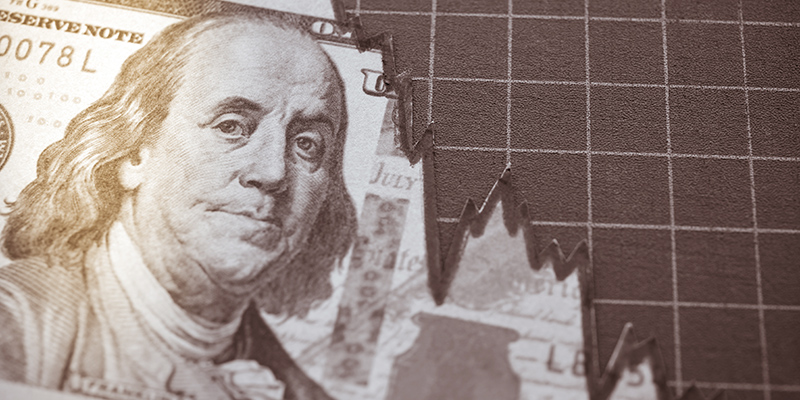One of the last things any homeowners association needs is a recession. But in what way can a recession affect the HOA? And what can HOA boards do about it?
How Does a Recession Affect the HOA?
A recession is a temporary economic decline marked by a fall in GDP for two consecutive quarters. While it does not always happen, it is still a real possibility. And according to historical data, recessions typically last an average of 10 to 17 months. For homeowners associations, that can translate to many months of financial hardship.
Homeowners associations are not invulnerable to economic dips. But how exactly does a recession affect the HOA?
An Increase in Delinquencies
 First of all, recessions usually see an increase in unpaid fees for HOA communities. Homeowners fund homeowners associations through the payment of regular dues. But, during a recession, there is high unemployment and lower economic output.
First of all, recessions usually see an increase in unpaid fees for HOA communities. Homeowners fund homeowners associations through the payment of regular dues. But, during a recession, there is high unemployment and lower economic output.
Many homeowners could suffer pay cuts or even lose their jobs altogether, resulting in a diminished or no steady income. And HOA dues tend to drop from owners’ priority lists when they are too busy saving money for food, heat, and mortgage payments.
An Increase in Vendor Fees
During a recession, raw materials and labor costs typically go up, and inflation is also a contributing factor. Vendors end up charging more for their products and services when this happens. And homeowners associations are forced to either adjust or slash their budgets.
Budget Deficits More Likely
When you combine the first two effects of a recession, HOAs will more likely face budget deficits. Because not enough homeowners pay their dues, the association can’t reach its target funding. And rising vendor fees can throw everything off course, too.
A budget deficit is unfavorable because the HOA can’t pay for all its necessary expenses, such as cleaning, maintenance, and insurance. When these expenses fall behind, the community suffers. For instance, the neighborhood will deteriorate more easily without cleaning and maintenance. All of this will ultimately cause trouble for the HOA.
How to Recession-Proof Your HOA
Homeowners associations can suffer several pitfalls during a recession. As such, it is important to prepare for a recession. The most obvious solution is to increase dues while owners can still pay them. But, if the HOA cannot increase dues easily, boards should take the following steps.
1. Review the Finances
 The first thing any association should do is review its finances. This will allow the board to understand the financial health of the community. Check the association’s bank accounts, reserve funds, and upcoming expenses. Evaluate which expenses or forthcoming projects are essential and which ones are not. Non-urgent costs might need to take a back seat while the economy — and the homeowners — recover.
The first thing any association should do is review its finances. This will allow the board to understand the financial health of the community. Check the association’s bank accounts, reserve funds, and upcoming expenses. Evaluate which expenses or forthcoming projects are essential and which ones are not. Non-urgent costs might need to take a back seat while the economy — and the homeowners — recover.
2. Make Necessary Cuts
Once you have a picture of the association’s finances, you can decide which expenses to cut. Expenses that usually get the boot are those that are expendable or luxury costs, and social events are a good example.
It is also worth looking for cheaper alternatives or vendors for essential costs. If not, consider negotiating a lower price or cutting back on some of the services you get. Hold off on getting that new gym equipment or having a new pool installed.
3. Consider Outside Funding
If your HOA is having difficulty meeting its target budget with just homeowner dues, consider seeking outside funding, such as a bank loan. When taking out a loan, please make sure to find one with low interest. Many banks have programs that specifically cater to homeowners associations. A loan will help your association supplement its budget, protect the reserves, and pay for emergency repairs (if needed).
4. Offer Help
Aside from ensuring the financial health of the HOA, boards should also try to assist struggling homeowners. Due to job loss and a higher cost of living during a recession, many homeowners might need more funds to pay for everything, including HOA dues. Your HOA board might consider offering payment plans to ease their troubles.
Additionally, some organizations offer relief in times of difficulty. Make sure to research local organizations to see what resources are available in your community. Sometimes, the government also steps in to help, which happened during the COVID-19 pandemic when owners struggledwhat happened during the COVID-19 pandemic when owners were struggling to keep up with mortgage and HOA payments. Once you have all the information, spread the word. This way, homeowners know what options are available to them.
If the recession didn’t affect your community as much, consider extending a helping hand to other communities. You can organize a fundraiser or make donations, and this is an excellent way to give back and build camaraderie with other communities.
 5. Seek Help
5. Seek Help
If your HOA board needs to be equipped to handle the effects of a recession, ask for help. Feel free to reach out to your HOA management company. Your HOA manager can help you devise a plan for the recession, cut unnecessary expenses, and even negotiate with vendors.
The Importance of Communication During a Recession
Recessions can be scary, not just for homeowners associations but for all residents. People are facing pay cuts, reduced work hours, and a higher cost of living. Many homeowners feel stressed during this time because they are still determining if they will still have a job the next day. And so an HOA that constantly knocks on their doors, asking for payment, can send them over the edge.
This is why communication matters. Make sure homeowners can reach the HOA board and the manager if they need help. Board members should also actively communicate with homeowners. Explain to them that the recession can affect the association, too, and that it will take everyone’s cooperation and understanding to keep the community afloat. Tell them of any expenses you had to cut back on, including any projects that have been delayed as a result.
Compassion is essential, but that doesn’t mean the association should completely do away with collections. Dues still play a vital role in the financial health of the community. Instead of eliminating rights, consider offering payment plans or early bird discounts.
Can a Recession Affect the HOA? Answered!
A recession can have long-lasting impacts on any homeowners association. Now that you know how to prepare for it, make sure to start your preparations early. Acting too late, when a recession is already in full force, may not yield desirable results.
Condo Manager offers advanced software solutions to HOAs and management companies. Call us today at (800) 626-1267 or contact us online for a free demo!
RELATED ARTICLES:
- HOA Audit: What Can It Say About Your HOA’s Financial Health?
- How To Read HOA Financial Statements And Understand Them
- How To Plan For The Yearly HOA Budget?



